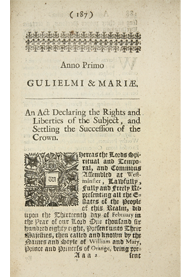The English Bill of Rights, 1689
In the later 17th century, the relative powers of English Parliament and monarch were debated in historical arguments that reached back to Magna Carta and beyond. In A Full and Clear Answer (1681), Robert Brady rejected the idea that Magna Carta referred to a true parliament on whose consent the king depended, against arguments made by William Petyt in The Antient Right of the Commons Asserted (1680). Brady's arguments may have been stronger, but Petyt and others were buoyed, as often in the period, by appeals to history and Magna Carta to locate the origins of English rights and the limits of governmental power. On another side of these arguments were theorists like John Locke, who in his Two Treatises on Government (1692) developed an account of the origin of individual rights and government based on natural law rather than the distant English past. Like Petyt, Locke famously championed a limited government accountable to the people, an idea that would have a significant impact in America.
Published in the same year as Petyt's tract, Hawles's The Englishman's Right reminded of the independence and the solemn duty of juries, which he called the foundation of English liberty. More influential was Henry Care's compilation of basic English "constitutional" laws and liberties (1682), with commentary: these included Magna Carta, the writ of habeas corpus, and the Petition of Right.
Works like these helped set the stage for 1689, and the accession to the throne of William and Mary. The co-regents were presented with the Declaration of Rights in March, followed in statutory form by the Bill of Rights. The English Bill of Rights was to become deeply important for constitutional thought in England, America and beyond. It stipulated, among other things, that monarchs would not tax without the agreement of Parliament; would not interfere in the law, or in Parliamentary elections; that freedom of speech in Parliament was guaranteed; that trial juries must be qualified; and that excessive fines and cruel punishments were prohibited.
![Title page of [Book title start] The Antient Right of the Commons of England Asserted ... [Book title end].](../riesenfeld_images/magnacarta/images/xxxpetyt1680thumb.png)
![Title page of [Book title start] A Full and Clear Answer to a Book ...[Book title end].](../riesenfeld_images/magnacarta/images/xxxbrady1681thumb.png)
![Title page of Locke's [Book title start] Two Treatises of Government [Book title end].](../riesenfeld_images/magnacarta/images/xxxlocke1689thumb.png)
![Title page of Hawles' [Book title start] The Englishman's Right, A Dialogue ... [Book title end].](../riesenfeld_images/magnacarta/images/xxxHawlesEnglishmanRightPSthumb.png)
![Title page of [Book title start] English Liberties; or, the Free-Born Subject's Inheritance [Book title end].](../riesenfeld_images/magnacarta/images/xxxCare4PSthumb.png)
![Title page of [Book title start] Anno Regni Gulielmi et Mariae [Book title end].](../riesenfeld_images/magnacarta/images/xxxAnnoprimo1689thumb.png)

![Title page of Somers' [Book title start] The Security of Englishmen's Lives ... [Book title end].](../riesenfeld_images/magnacarta/images/xxxsomers1727thumb.png)